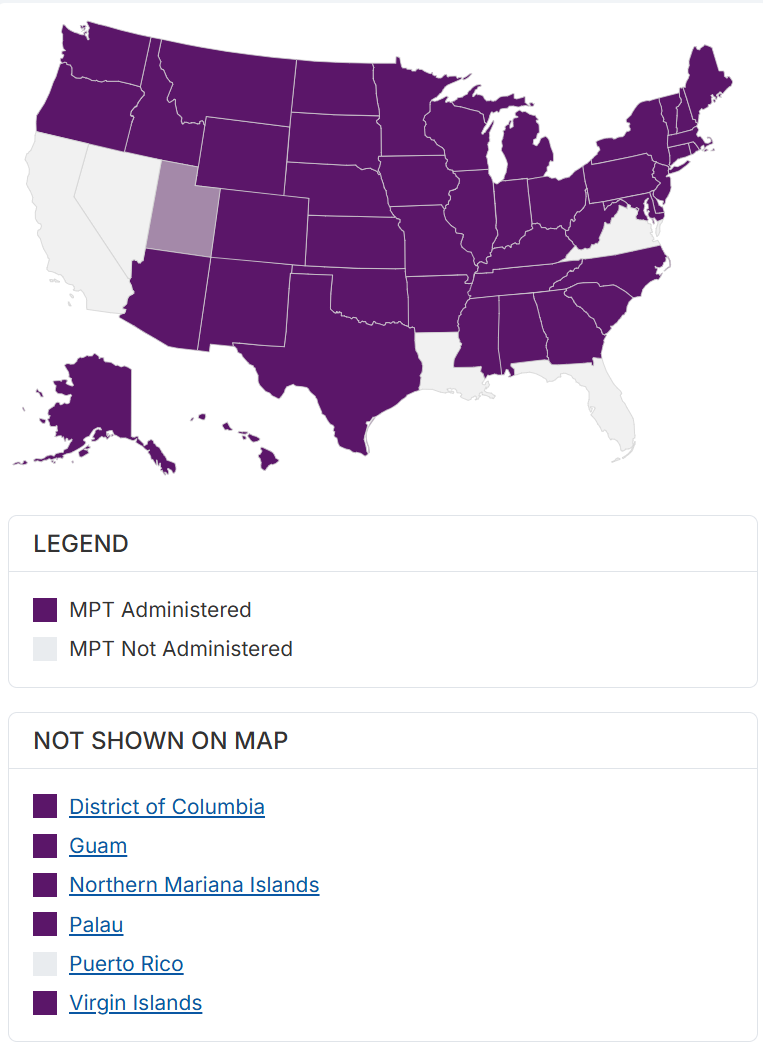What Are The Most Common MPT Tasks?
The Multistate Performance Test (MPT) is a large percentage of your bar exam score. If you take the Uniform Bar Exam, it is worth 20% of your score! It is important to be familiar with the MPTs most likely to appear on the exam. In this post, we cover the most common MPT tasks. Read further to see our breakdown!
What Are The Most Common MPT Tasks?
What is the Multistate Performance Test (MPT)?
The National Conference of Bar Examiners (NCBE) drafts the Multistate Performance Test (MPT). The examination consists of two, 90-minute tasks. Many jurisdictions administer the MPT, and it is most often administered as part of the Uniform Bar Exam (UBE). Below you can see a map of the jurisdictions where the MPT is administered.

Image courtesy of the NCBE’s website. Image current as of December 20, 2024. Please check the NCBE website for the most up-to-date list of states.
Not all of the jurisdictions that administer the MPT administer it as part of the UBE. Some jurisdictions may choose one or both tasks from the MPT to be part of its bar examination.
According to the NCBE, the goal of the MPT is to test an examinee’s “fundamental lawyering skills in a realistic situation and complete a task that a beginning lawyer should be able to accomplish.” The most common MPT tasks include things like drafting an objective memorandum or a persuasive brief. Rather than testing your memorization of any topic of law, this section is solely focused on your ability to apply a law to the set facts associated with the task. Examinees are given a file and a library. The file will contain source documents detailing all the facts of the case, whether or not they are relevant. The library will include statutes, case law, regulations, or rules which examinees may use to complete the task. Again, rather than testing examinees’ substantive knowledge of the law, the MPT tests their ability to discern and apply the law in an effective, lawyerly fashion. Now that you know what the MPT is, let’s move on to how it will affect your overall bar exam score.
How is it scored?
How the MPT is scored varies in each jurisdiction. If you want the most accurate information about how the MPT is scored in your state, consult you state bar examiners’ website. When the MPT is part of the UBE, it is worth 20% of your overall bar exam score. That’s equivalent to four MEE essays!
Why does it matter?
The MPT is an important part of your bar exam score. So, in short, the MPT matters because passing the bar exam matters. Beyond just passing the bar though, the MPT is a good measure of someone’s lawyering skills. During the MPT, like in practice, you won’t be required to memorize the law and answer essay questions or multiple-choice questions about that information. Rather, you’ll complete real-life tasks like drafting a brief, drafting a motion, or drafting a memorandum for another attorney. The MPT places strict time restrictions on completing these tasks. And it’s not likely that you’ll experience such harsh time constraints in practice. However, the most common MPT tasks are things you will come across frequently in practice. As you probably know, the practice of law can be very hectic. Bar examiners use the MPT to measure whether an examinee can complete work that a licensed attorney would do, under strict time constraints. If you can draft a good motion in 90 minutes, you can probably draft a good motion in an afternoon in real life!
How should I prepare?
The key is to take the MPT seriously! Many law students think they don’t need to practice for the MPT because they have been doing these types of tasks in school or at their jobs. It’s true that you likely have experience completing common MPT tasks, but we doubt you’ve done them under the type of conditions you’ll be facing on bar exam day. Make sure you practice!
Additionally, because the MPT isn’t worth as much of your bar exam score as other portions of the test, students tend to put off studying for it. Not taking the MPT seriously could damage your overall score. Not doing well on something worth 20% of your score (in UBE jurisdictions) could be the difference between passing and not passing the bar. However, you should allot your study time proportionately. We’re not saying you should study more for the MPT than you do for the MBE. But we are saying don’t abandon the MPT! Instead, focus on your practice on the most common MPT tasks. That leads us to . . .
What has been tested on past MPTs?
The most common MPT tasks include writing an objective memo or a persuasive brief. However, like we mentioned, other tasks might include writing an opinion or demand letter, drafting leave-behind legislation, or writing a bench memo. Check out our MPT task frequency chart here.
Let’s address some of the most common MPT tasks in a bit more detail.
Objective Memo
The objective memo is the most common MPT task. Like every MPT task, you’ll be given all of the substantive information you need to write the objective memo. You’ll be tasked with putting that information together into a coherent and helpful objective memo. Make sure you have a basic format for an objective memo memorized. It should include a heading, an introduction, a discussion, and a conclusion. Something like this is what you’re aiming for:
Memorandum
To: Party listed in file
From: Examinee
Re: [insert title of the MPT]
Date:
- Introduction: several sentences briefly noting the purpose of the task and your conclusions
- Discussion: create headings for each issue you discuss
III. Conclusion: summarize your discussion and your findings
Be sure to utilize all relevant law in your objective memo. That means you’ll also need to address law that is unfavorable. Again, the objective memo is perhaps the most common MPT task, and you need to know that this task is not asking you to show just one side of the issue!
Persuasive Brief
The persuasive brief is also one of the most common MPT tasks. And it shouldn’t come as a surprise that a persuasive brief should be persuasive! That means you should use persuasive language and be sure to take one side of an issue. While you should always acknowledge any flaws in your argument, be sure you don’t end up equally arguing both sides of an issue.
Generally, your persuasive brief should not look like a persuasive brief you’d write in law school. There’s no need for a table of contents or a section on the case’s procedural history. Instead follow the instructions provided in the task memo closely. Your main focus should be your legal argument and your conclusion. Focus on the legal argument first. This is what is most important to the examiners grading of your MPT, and it should take you the longest to write. That way, if you run into issues with timing, the majority of your work will be done. Plus, it’s easier to write an introduction and conclusion after you’ve flushed out your legal argument. Try to keep this general format as you write your MPT:
- Statement of the case (identify the parties, the nature of the case, the issue in dispute, what “stage” the case is in—e.g. discovery, on appeal, and the requested relief)
- Statement of facts (if the task memo asks you to include one)
- Legal argument (With headings to separate each argument. Headings should be complete sentences with strong conclusions. Follow rule/analysis/conclusion after each heading.)
- Conclusion
Demand Letter
After the objective memo and persuasive brief, the demand letter is the next most common MPT task. In a demand letter, you should be persuasive but not confrontational. Most importantly, you need to be very specific in your conclusion about what you are demanding of the recipient. Use this general format for a demand letter:
- Caption
- Introductory paragraph
- Body of the letter
- Heading 1
- Heading 2
- Heading 3
- Conclusion
Opinion Letter
An opinion letter is another common MPT task, but it isn’t nearly as common as a persuasive brief or objective memo. Opinion letters are not all the same. You’ll need to focus heavily on what the task memo asks you to do. Additionally, make sure you are clear about what opinion you are giving. For example, if the opinion letter is meant for a client, be sure to communicate your opinion clearly without bogging it down with complicated legal jargon. This may seem counterintuitive, but the MPT tests real lawyering skills. Communicating complex ideas to clients is a task you’ll have to do as an attorney! Follow this general format for drafting an opinion letter:
- Caption
- Introduction
- Body (with headings)
- Conclusion (a brief summary)
Wildcard Tasks
Sometimes the NCBE will test examinees using something that isn’t a common MPT task. These “wildcard” tasks might be something like drafting a closing argument or writing articles of association for an organization. We provide details about some of the past wildcard tasks on the MPT in this post. Typically these tasks will have very detailed instructions in the task memo. Follow them carefully and don’t panic! Sometimes these tasks actually end up being easier than something like the more common objective memo because you are provided with such detailed instructions.
We’ve collected each of the tasks tested on the MPT since February 2009. You can read the MPT files and a model answer for each by clicking on the corresponding link. Look through this table to get an idea of what you might be able to expect on the upcoming MPT!
| July 2024 | In re Girard | Objective Memorandum | https://www.nybarexam.org/ExamQuestions/QAJUL2024.pdf |
| July 2024 | CDI Inc. v. Sidecar Design LLC | Objective Memorandum | https://www.nybarexam.org/ExamQuestions/QAJUL2024.pdf |
| February 2024 | State of Franklin v. Iris Logan | Objective Memorandum | https://www.nybarexam.org/ExamQuestions/qafeb2024.pdf |
| February 2024 | State v. Driscoll | Objective Memorandum | https://www.nybarexam.org/ExamQuestions/qafeb2024.pdf |
| July 2023 | Martin v. The Den Breeder | Opinion Letter | https://www.ble.mn.gov/wp-content/uploads/2023/11/Representative-Good-Answers-July-2023.pdf |
| July 2023 | Dobson v. Brooks Real Estate Agency | Persuasive Brief | https://www.ble.mn.gov/wp-content/uploads/2023/11/Representative-Good-Answers-July-2023.pdf |
| February 2023 | In re Hill | Objective Memorandum | https://www.ble.mn.gov/wp-content/uploads/2023/05/Representative-Good-Answers-Feb-2023.pdf |
| February 2023 | B&B Inc. v. Happy Frocks Inc. | Persuasive Brief | https://www.ble.mn.gov/wp-content/uploads/2023/05/Representative-Good-Answers-Feb-2023.pdf |
| July 2022 | In re Nina Briotti | Objective Memorandum | https://www.ble.mn.gov/wp-content/uploads/2022/11/Representative-Good-Answers-July-2022.pdf |
| July 2022 | In re Marriages of Walter Hixon | Objective Memorandum | https://www.ble.mn.gov/wp-content/uploads/2022/11/Representative-Good-Answers-July-2022.pdf |
| February 2022 | Painter v. Painter | Objective Memorandum | https://jdadv.co/42T0dIJ |
| February 2022 | State of Franklin v. Ford | Persuasive Brief | https://www.ble.mn.gov/wp-content/uploads/2022/05/Representative-Good-Answers-February-2022.pdf |
| July 2021 | Winston v. Franklin T-shirts Inc. | Objective Memorandum | https://www.ble.mn.gov/wp-content/uploads/2021/11/Representative-Good-Answers-July-2021.pdf |
| July 2021 |
In re Canyon Gate Property Owners Association
| Opinion Letter | https://www.ble.mn.gov/wp-content/uploads/2021/11/Representative-Good-Answers-July-2021.pdf |
| February 2021 | In re Mills | Objective Memorandum | https://www.ble.mn.gov/wp-content/uploads/2021/05/Representative-Good-Answers-February-2021.pdf |
| February 2021 | State v. Kilross | Persuasive Brief | https://www.ble.mn.gov/wp-content/uploads/2021/05/Representative-Good-Answers-February-2021.pdf |
| October 2020 | Klein v. State of Franklin | Objective Memorandum | https://jdadv.co/432qzId |
| October 2020 |
Franklin Statehood Enabling Act
| Persuasive Memo | https://www.gabaradmissions.org/oct20q |
| September 2020 | Eastwood v. Eastwood | Opinion Letter | https://www.ble.mn.gov/wp-content/uploads/2020/12/Representative-Good-Answers-September-2020.pdf |
| September 2020 | State of Franklin v. Daniels | Persuasive Brief | https://www.ble.mn.gov/wp-content/uploads/2020/12/Representative-Good-Answers-September-2020.pdf |
| July 2020 | Fun4Kids Terms of Service Agreement | Objective Memorandum | https://www.ble.mn.gov/wp-content/uploads/2020/10/Representative-Good-Answers-July-2020.pdf |
| July 2020 | In re Alice Lindgren | Persuasive Brief | https://www.ble.mn.gov/wp-content/uploads/2020/10/Representative-Good-Answers-July-2020.pdf |
| February 2020 | Downey v. Achilles Medical Device Company | Objective Memorandum | https://www.ble.mn.gov/wp-content/uploads/2020/05/Representative-Good-Answers-February-2020.pdf |
| February 2020 | In re Eli Doran | Wildcard Task (examinees were asked to draft a closing argument) | https://www.ble.mn.gov/wp-content/uploads/2020/05/Representative-Good-Answers-February-2020.pdf |
| July 2019 | American Electric v. Wuhan Precision Parts | Objective Memorandum | https://www.ble.mn.gov/wp-content/uploads/2019/11/Representative-Good-Answers-July-2019.pdf |
| July 2019 | Estate of Carl Rucker | Objective Memorandum | https://www.ble.mn.gov/wp-content/uploads/2019/11/Representative-Good-Answers-July-2019.pdf |
| February 2019 | State of Franklin Dep’t of Children and Families v. Little Tots Child Care Center | Persuasive Brief | https://www.ble.mn.gov/wp-content/uploads/2019/05/Representative-Good-Answers-Feb-2019.pdf |
| February 2019 | In re Remick | Objective Memorandum | https://www.ble.mn.gov/wp-content/uploads/2019/05/Representative-Good-Answers-Feb-2019.pdf |
| July 2018 | State of Franklin v. Hale | Persuasive Brief | https://www.ble.mn.gov/wp-content/uploads/2018/11/Representative-Good-Answers-July-2018.pdf |
| July 2018 | Rugby Owners and Players Association | Wildcard Task (examinees were asked to draft articles of association) | https://www.ble.mn.gov/wp-content/uploads/2018/11/Representative-Good-Answers-July-2018.pdf |
| February 2018 | State of Franklin v. Clegane | Persuasive Brief | https://www.ble.mn.gov/wp-content/uploads/2018/05/February-2018-Representative-Good-Answers.pdf |
| February 2018 | In re Hastings | Objective Memorandum | https://www.ble.mn.gov/wp-content/uploads/2018/05/February-2018-Representative-Good-Answers.pdf |
| July 2017 | Peek et al v. Doris Stern and Allied Behavioral Health Services | Persuasive Brief | https://www.ble.mn.gov/wp-content/uploads/2017/10/July-2017-Representative-Good-Answers.pdf |
| July 2017 | In re Zimmer Farm | Objective Memorandum | https://www.ble.mn.gov/wp-content/uploads/2017/10/July-2017-Representative-Good-Answers.pdf |
| February 2017 | In re Ace Chemical | Objective Memorandum | https://www.ble.mn.gov/wp-content/uploads/2017/05/February-2017-Representative-Good-Answers.pdf |
| February 2017 | In re Guardianship of Henry King | Bench Memo | https://www.ble.mn.gov/wp-content/uploads/2017/05/February-2017-Representative-Good-Answers.pdf |
| July 2016 | In re Whirley | Objective Memorandum | https://www.ble.mn.gov/wp-content/uploads/2016/11/July-2016-Representative-Good-Answers.pdf |
| July 2016 | Nash v. Franklin Department of Revenue | Persuasive Brief | https://www.ble.mn.gov/wp-content/uploads/2016/11/July-2016-Representative-Good-Answers.pdf |
| February 2016 | In re Anderson | Objective Memorandum | https://www.ble.mn.gov/wp-content/uploads/2016/09/February-2016-Representative-Good-Answers.pdf |
| February 2016 | Miller v. Trapp | Objective Memorandum/Demand Letter (examinees were asked to draft a demand letter and an objective memo) | https://www.ble.mn.gov/wp-content/uploads/2016/09/February-2016-Representative-Good-Answers.pdf |
| July 2015 | In re Bryan Carr | Opinion Letter | https://jdadv.co/44apKy0 |
| July 2015 | In re Franklin Aces | Opinion Letter | https://jdadv.co/44apKy0 |
| February 2015 | In re Harrison | Objective Memorandum | https://jdadv.co/3PvpQwo |
| February 2015 | In re Community General Hospital | Demand Letter | https://jdadv.co/3PvpQwo |
| July 2014 | In re Kay Struckman | Objective Memorandum | https://jdadv.co/44hYxtE |
| July 2014 | In re Linda Duram | Demand Letter | https://jdadv.co/44hYxtE |
| February 2014 | In re Peterson Engineering Consultants | Objective Memorandum | https://jdadv.co/43XiyWm |
| February 2014 | In re Rowan | Persuasive Brief | https://jdadv.co/43XiyWm |
| July 2013 | Palindrome Recording Contracts | Objective Memorandum/Wildcard Task (examinees were asked to write an objective memo explaining the decision to redraft provisions in a contract) | https://jdadv.co/3pn6qiA |
| July 2013 | Monroe v. Franklin Flags Amusement Park | Persuasive Brief | https://jdadv.co/3pn6qiA |
| February 2013 | In re Guardianship of Will Fox | Persuasive Brief | https://www.gabaradmissions.org/feb13q |
| February 2013 | In re Wendy Martel | Opinion Letter | https://www.gabaradmissions.org/feb13q |
| July 2012 | Ashton v. Indigo Construction Co. | Persuasive Brief | https://www.gabaradmissions.org/july12q |
| July 2012 | State of Franklin v. Soper | Bench Memo | https://www.gabaradmissions.org/july12q |
| February 2012 | In re WPE Property Development, Inc. | Opinion Letter | https://www.gabaradmissions.org/feb12q |
| February 2012 | Franklin Resale Royalties Legislation | Wildcard Task (examinees were asked to draft leave-behind legislation) | https://www.gabaradmissions.org/feb12q |
| July 2011 | In re Field Hogs, Inc. | Objective Memorandum (examinees were asked to draft an objective memo in which one of the sections required examinees to draft an arbitration clause) | https://www.gabaradmissions.org/july11q |
| July 2011 | In re Social Networking Inquiry | Persuasive Memo | https://www.gabaradmissions.org/july11q |
| February 2011 | In re Magnolia County | Objective Memorandum | https://jdadv.co/3pnVd0Y |
| February 2011 | Butler v. Hill | Objective Memorandum (examinees were asked to draft an objective memo and a closing argument) | https://jdadv.co/43YMXDY |
| July 2010 | City of Ontario | Objective Memorandum | https://jdadv.co/43bY3Et |
| July 2010 | In re Hammond | Persuasive Brief | https://juraxbar.com/wp-content/uploads/2019/01/MPT-Jul-2010.pdf |
| February 2010 | State of Franklin v. McLain | Persuasive Brief | https://juraxbar.com/wp-content/uploads/2019/01/MPT-Feb-2010.pdf |
| February 2010 | Logan v. Rios | Wildcard Task (examinees were asked to draft an early dispute resolution statement) | https://juraxbar.com/wp-content/uploads/2019/01/MPT-Feb-2010.pdf |
| July 2009 | Jackson v. Franklin Sports Gazette, Inc. | Objective Memorandum | https://jdadv.co/3NKUxw8 |
| February 2009 | Phoenix Corporation v. Biogenesis, Inc. | Objective Memorandum | https://juraxbar.com/wp-content/uploads/2019/01/MPT-Feb-2009.pdf |
| February 2009 | Ronald v. Department of Motor Vehicles | Persuasive Memorandum | https://juraxbar.com/wp-content/uploads/2019/01/MPT-Feb-2009.pdf |
Keep in mind that the best way to be prepared for the MPT is to practice! Knowing what to expect so you can stay calm and perform well on exam day is half the battle. Use the past MPT exams listed above to practice under timed conditions. Try to focus on the most common MPT tasks. Examinees often overlook the MPT. Make sure you spend adequate time preparing for it, and it will help you achieve a high score and pass the bar exam. Good luck!
Looking to Pass the Bar Exam?
Free Resources:
- 🌟Bar Exam Free Resource Center: Access our most popular free guides, webinars, and resources to set you on the path to success.
- Free Bar Exam Guides: Expert advice on the MBE, the MEE, passing strategies, and overcoming failure.
- Free Webinars: Get insight from top bar exam experts to ace your preparation.
Paid Resources:
- 🏆One-Sheets: Our most popular product! Master the Bar Exam with these five-star rated essentials.
- Bar Exam Outlines: Our comprehensive and condensed bar exam outlines present key information in an organized, easy-to-digest layout.
- Exclusive Mastery Classes: Dive deep into highly tested areas of the MBE, MEE, MPT, and CA bar exams in these live, one-time events.
- Specialized Private Tutoring: With years of experience under our belt, our experts provide personalized guidance to ensure you excel.
- Bar Exam Courses: On Demand and Premium options tailored to your needs.
- Bar Exam Crash Course + Mini Outlines: A great review of the topics you need to know!
🔥 NEW! Check out our Repeat Taker Bar Exam Course and our new premier Guarantee Pass Program!



